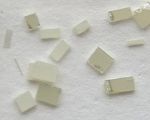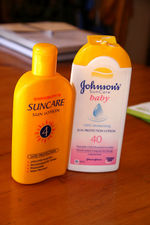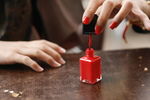Titanium dioxide
| Titanium dioxide | |
|---|---|
 
| |
| General | |
| Systematic name |
Titanium dioxide |
| Other names |
Titania |
| Molecular formula | TiO2 |
| SMILES | O=[TI]=O |
| Molar mass | Molar mass::79.866 g/mol |
| Appearance | White solid |
| CAS number | CAS number::13463-67-7 |
| Properties | |
| Density and phase | Density::4.23g/ml |
| Solubility in water | Insoluble |
| Melting point | Melting point::1,843°C |
| Boiling point | Boiling point::2,972°C |
| Hazards | |
| MSDS | Material safety data sheet |
| Main hazards | None |
| NFPA 704 | |
| Flash point | Non-flammable |
| RTECS number | XR2275000 |
| Related compounds | |
| Other cations | |
| Related Oxides | Titanium(II) oxide Titanium(III) oxide Titanium(III,IV) oxide |
| Related compounds | Titanic acid |
| Except where noted otherwise, data are given for materials in their standard state (at 25 °C, 100 kPa) Disclaimer and references | |
Titanium dioxide is an inorganic chemical compound with the formula TiO2. It is used throughout for multiple purposes, such as sunblock, BB cream, CC cream, but is also used for other purposes such as paper, toothpaste, and paint. Companies do use other compounds for these products but people prefer Titanium dioxide the most because it is proven to be not harmful.[1]
Properties
Titanium dioxide is a compound that does not react with other compounds in most occasions. It does not normally react under room temperature conditions either. Titanium dioxide is not soluble with water but it melts with alkali metals. At high temperatures, Titanium dioxide often gains an oxygen particle. [2] Titanium dioxide forms a thin layer when it contacts human body. This is why people use it so much for cosmetic purposes. The thin layer stays on the body before it contacts other compounds that destroy the thin layer, which often times are called Cleansing Cream. It is also insoluble by with water (H2O), which makes it a waterproof material. Most sunblocks don't have the waterproof feature so Titanium dioxide was a revolutionary discovery.[3]
Occurrences
Titanium dioxide is easily found in nature as well-known minerals rutile, anatase and brookite. The most common form is rutile, which is also the equilibrium phase at all temperatures. The metastable anatase and brookite phases both convert to rutile upon heating. [3]
There's a big difference between Titanium dioxide and a regular Titanium. Regular Titanium is used commercially most times. Regular Titanium is non-modified Titaniums. Titanium dioxide has different types of modifications. It has eight modifications, consisting three metastable forms and five high pressure forms. Produced synthetically, metastable forms are produced in monoclinic, tetragonal, and orthorombic forms. Titanium is found easily throughout nature so modifying it wouldn't cost much because of its abundance. [3]
Uses
Titanium dioxide is frequently used for cosmetic purposes. It has its natural resistance to sunlight so most cosmetic products with sun-block features Titanium dioxide. Although there are other substances that block sunlight but Titanium dioxide is commonly used mostly because it is safe and non-irritating to human skin. The substance does not penetrate the skin layer but it spreads around the skin easily therefore, blocking sunlight by staying on the skin. Also the substance is not flammable in any circumstance, meaning, if fire touches the skin it does not react. Most cosmetic products nowadays have the sun-block features in it; such as BB creams or CC creams. Since they are commonly used, it is commercialized throughout the industry as a coat for the skin. [4] However some people are allergic to this substance but it is very rare. The allergic reactions can include having rashes, itching, breathing problems, or swelling. Also if this substance is ingested while it is used for cosmetic purposes, the person should see the doctor because it can be poisonous for the person if it's taken into the digestive system. [5] Titanium dioxide is also used for food because of its nutritional values. Therefore if its approved by FDA to eat, it is safe to eat. It is dangerous for people to eat it when its used for cosmetic purposes because it has other substances that react with Titanium dioxide that gets dangerous. One example of this substance used other than skin nor food purposes is that it's used for toothpastes too. [6]
There are two major types of sunlight that produce sunburns, which can lead to skin cancer. They are UVA and UVB lights and most products have UVB resistance but one should find those that have both UVA and UVB resistance (Titanium dioxide does block both UVA and UVB lights.) [5]
Distribution
Titanium dioxide is widely used for cosmetic purposes as mentioned before. Although it is used mostly for this purpose, it can be used for paint, tooth paste, papers, and inks because of its color. No studies have proved that Titanium dioxide is harmful in anyway but it does penetrate human skin when it is in a nano form. When they've tried Titanium dioxide on a mouse, it had defects. But for humans, it has no defects because mice and humans have different skin layers and it is proven to be not harmful for humans. [3]
Video
References
- ↑ Banfield, J. F., Veblen, D. R., and Smith, D. J.. The identification of naturally occurring TiO, (B) by structure determination using high-resolution electron microscopy, image simulation, and distanceJeast-squares refinement Minsocam. Print. Published 1991.
- ↑ Properties of Titanium dioxide Lookchem. Web. Accessed 06 May 2015.
- ↑ 3.0 3.1 3.2 3.3 Titanium dioxide Nanum. Web. Accessed 06 May 2015.
- ↑ Titanium dioxide Paula's choice. Web. Accessed 20 April 2015.
- ↑ 5.0 5.1 Titanium dioxide topical Web MD. Web. Accessed 20 April 2015. Unknown author. Cite error: Invalid
<ref>tag; name "MD" defined multiple times with different content - ↑ Titanium dioxide Drugs.com. Web. Accessed 20 April 2015. Unknown author.
| ||||||||||||||




